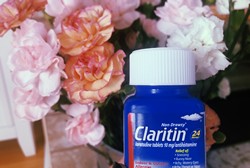Some University students are suffering from fall seasonal allergies and are feeling sick. It is very common to brush off the symptoms of allergies and say, “It’s just allergies.” But allergies can have a major impact on our health.
Fall seasonal allergies usually begin to flare up at the beginning of the fall semester. Polina Amburg, specialist professor of nursing, said, “The symptoms usually worsen around September and October.” So, if you’re suffering from allergies right now, you are not alone.
Carol Huggler, a nurse practitioner at the Health Center, said, “There seems to be the same amount of patients exhibiting fall allergy symptoms this fall semester as last year. Because we are having warm weather without a killing frost in October, we may continue to see allergy symptoms longer this fall.”
According to Huggler, the Health Center has had patients come in with viral infections, such as cold or upper respiratory infections. These illnesses could have begun with seasonal allergy symptoms.
“If your runny nose persists after trying your allergy medication daily and following the tips above, come to the Student Health Center on campus to be evaluated by one of our nurse practitioners,” Huggler said.
Amy Czerepak, a senior nursing student who has done clinical work at Monmouth Medical and Community Nursing, said, “A key sign that it’s seasonal is that the symptoms are worse in the morning when you wake up.”
Amburg said, “Ragweed is the most common fall allergen. Although the most common known allergen is pollen, some people might experience allergic reactions to fallen leaves and some seasonal fruits.”
According to the Allergy & Asthma Specialists, P.C., of New Jersey official website, ragweed grows in abundance in New Jersey. One plant can produce one billion grains of pollen per season and can travel up to 400 miles in the wind. Ragweed grows in vacant lots, along the side of the road, as well as in fields.
People who suffer from allergies normally experience multiple symptoms. Amburg explained, “Some might experience mild sneezing and coughing, while others demonstrate signs of severe respiratory distress and require medical attention. In severe cases, a person may need to seek urgent medical attention, but most people usually experience mild to moderate discomfort, such as a runny nose.”
Allergies can leave people with asthma more susceptible to needing their inhalers. Other people may experience an increase in sinus infections. That is why it is important to not treat allergies as something insignificant.
“We usually recommend that patients with seasonal allergies begin taking their daily antihistamine [such as Claritin] in mid-late August when the goldenrod and ragweed begin to bloom. Then, continue the antihistamine until the first killing frost, usually in October,” said Huggler.
Huggler offered the following tips for individuals taking allergy medications: sleep with the windows closed; shower at night to remove any mold spores from the body; avoid raking leaves due to agitation of pollen and mold in the air; track symptoms using a journal or credible online resource; and visit the Health Center, primary care doctor, or allergy specialist for preventative measures.
Czerepak said, “I do think allergies are a problem at Monmouth because we have a lot of flowers and trees and fresh grass. All the foliage on campus will let out a lot of spores causing allergies to act up. But in reality, seasonal allergies can affect us anywhere in New Jersey.”
The abundance of fall allergies could have a negative effect on students’ ability to perform well in their classes. Amburg said, “Allergies, like many other health issues, take a lot of energy from the person. People might feel tired, exhausted, and have difficulty concentrating. This is especially detrimental for students.”
Allergy testing can be done to determine the specific allergens that someone reacts to. Allergy shots are another option for people who experience severe symptoms. If your fall allergies are negatively impacting your quality of life, do not hesitate to consult an allergist.
PHOTO TAKEN by Jenna Puglisi




